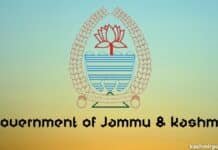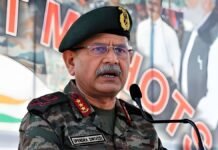
DODA — The Indus Water Treaty (IWT) cat is out of the bag again as a 40-member delegation comprising Pakistanis, Indians and neutral experts today had an extensive tour of different units of the 850-mega-watt Ratle hydroelectric power project in Kishtwar district.
The delegation after landing at Kishtwar helipad on India’s most trusted Boeing CH-47 Chinook heavy-lift helicopter straightway drove to Ratle hydroelectric power project site situated on the banks of river Chenab at Drabshala on Batote-Kishtwar national highway in Kishtwar district.
According to the news agency KNO, the delegation was taken to the project site in high security and people including the workers at the project site were kept at bay and everything was done in a secret atmosphere.
“After reaching the project site, the delegation visited the offices where they went through the papers related to the construction of the project and got a briefing from the National Hydroelectric Power Corporation (NHPC) officers,” a source in the Ratle project said.
The delegation will be staying in Kishtwar for a few days and is also expected to visit the 1000-megawatt Pakal Dool hydroelectric project being built on the Marusudar River coming from Marwah, a tributary of river Chenab.
The 850-megawatt Ratle power project is a run-of-the-river project which was started 11 years ago when on June 25, 2013 the then Prime Minister Dr Manmohan Singh had laid the foundation stone from Chowgan ground at Kishtwar. The project was delayed after some internal issues and also when the construction GVK Reddy group had ended the agreement with the government.
Pakistani government in the year 2016 had written to the World Bank and raised objections over the design features of two projects including the Ratle and Kishanganga project and had sought settlement through neutral experts. Later on, Pakistan had withdrawn the request and had sought adjudication through the Court of Arbitration, to which India objected and sought settlement through neutral experts.
The negotiations failed as neither of the parties backtracked, which forced the World Bank to appoint a neutral expert and the chair of the Court of Arbitration in October 2022 and issued notices for the modification of the treaty. India had warned that nothing like such parallel consideration is covered under the IWT.
In July 2023, the Court of Arbitration ruled that it was “competent to consider and determine the disputes set forth by Pakistan’s request for arbitration.” After filing its first Memorial, Pakistan presented its documents supporting its legal case and the Court held its first visit to the Neelum-Jhelum Hydro-Electric Plant in Pakistan-administered Kashmir which was aimed to familiarising with the general aspects of the design and operation of run-of-river hydro-electric plants along the Indus system of rivers.
India refused to take part in the Court of Arbitration and submitted its Memorial to the neutral experts and in September last year, Pakistan joined the second meeting of the parties held by neutral experts in Vienna.
Meanwhile, as the Boeing CH-47 Chinook high-lift helicopter entered the skies of Kishwar, it became the major attraction for people living in the town.
All the eyes were skywards and many people were seen capturing the images and videos of the helicopter landing at a helipad in Kishtwar near Chowgan ground.
Follow Us
The Kashmir Pulse is now on Google News. Subscribe our Telegram channel and Follow our WhatsApp channel for timely news updates!










